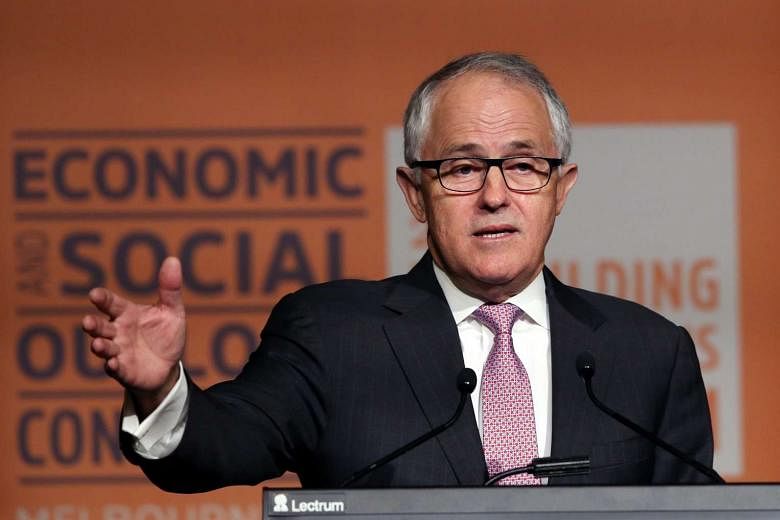Australian Prime Minister Malcolm Turnbull is facing calls to usher in a new era of closer relations across the Asia-Pacific region, one that includes Australia joining Asean in the long run.
The moves have been buoyed by the new prime minister's own displays of outward-looking enthusiasm and concerns that such progress has been limited despite numerous declarations by Australian leaders of all political stripes about the need to seize the opportunity presented by the so-called Asian Century.
On the one hand, Australians have long since accepted and welcomed the benefits of mass skilled migration from across Asia, growing investment ties and the emergence of China eight years ago as Australia's biggest trading partner.
On the other hand, most observers believe Australia has yet to take the next steps - to overhaul its foreign relations, including a sustained regional engagement, promote teaching of Asian languages as well as people-to-people ties, and shifting the national focus away from its traditional ties to the United States and Britain.
The emergence of Mr Turnbull, a former investment banker who presents himself as a fresh-thinking pro-business entrepreneurial-style leader, has sparked hopes of change.
The Liberal leader, who deposed Mr Tony Abbott as prime minister in September, has insisted that Australia has a bright future: One of his main arguments has been to point to the country's proximity to the Asia-Pacific.
Last week, for instance, he began an address to the Business Council of Australia by declaring that the transformation of Asia's middle class presented Australia with "opportunities (that) are absolutely extraordinary".
"There has never been a more exciting time for Australia. The only barriers, the only constraints, the only limitations we have, my friends, are our own imagination or our own enterprise," he said.
Some analysts are hoping this enthusiasm will lead Mr Turnbull to adopt a similar stance on foreign policy as that of former prime minister Paul Keating, a fellow staunch republican. Mr Keating believed Australia should seek independence from Britain and solidify its place within the region - a crucial component of the formation of Australia's long-term national identity.
Mr Keating has called for Australia to seek to join Asean - and numerous analysts believe Mr Turnbull should follow suit, especially with the launch of the Asean Economic Community at the end of this year.
Australia's veteran former diplomat Richard Woolcott said Mr Turnbull's rise has coincided with the need for "long-overdue" foreign policy adjustments, including attempting to join Asean.
Noting that the association would need to welcome such a move, he said Canberra should consult privately at several levels - the prime minister, foreign minister, defence minister and trade minister - possibly starting with a push for observer status. The effort, he said, would mark "a logical evolution of Australia's longstanding engagement with Asia".
"Australia needs a fundamental change of our national psyche focused more on Asia than on our traditional links with the US, (Britain), Canada, New Zealand and Europe," he wrote on Lowy Institute's Interpreter blog.
Australia has longstanding ties with Asean. As far back as 1974, it became the first of its 10 dialogue partners. Two-way trade is now worth almost A$100 billion (S$100 billion) a year and Australia has had a resident ambassador at the Asean Secretariat in Jakarta since 2013.
Mr Graeme Dobell, a fellow at the Australian Strategic Policy Institute, said the attempt to join Asean "would offer a new dimension to the Turnbull government's narrative about an optimistic country living in Asia in the best of times".
The move should be gradual, he said, beginning with an initial push for observer status within a decade. "The 10-member association will take a mountain of convincing. The other country which would have to make big changes in its thinking and understanding of itself is Australia," he wrote on the institute's blog.
But some opponents believe Asean will not accept Australia and that joining the association would stifle Canberra's ability to criticise member nations, particularly on human rights issues.
Nonetheless, the calls for closer regional ties - beyond merely pursuing trade opportunities with China - have been virtually unanimous.
An expert on South-east Asian economies, Professor Hal Hill, from the Australian National University, said Australian political leaders have not had "any sort of immersion experience in the region" and that business leaders have been too focused on the "rich north".
Government figures show that the US and Britain alone accounted for about 46 per cent of Australian investment abroad last year. Singapore was seventh, with 2.6 per cent of Australian investment.
"There continues to be a sense of drift in our relationship with these (Asean) countries, at all levels - government, business, academia, the media and civil society," Prof Hill wrote in The Australian Financial Review on Oct 30.
"While we must maintain close relations with the far-off powers of yesterday and today, the Asean countries and their neighbourhood are where our economic and political future lies."


